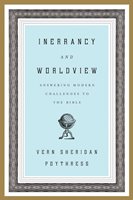About the Author
Vern Sheridan Poythress is professor of New Testament interpretation at Westminster Theological Seminary in Philadelphia. He has six earned degrees, including a PhD from Harvard University and a ThD from the University of Stellenbosch, South Africa. Poythress is the author of eleven books on aspects of biblical interpretation and on science.
Introduction
This book places the discussion of biblical inerrancy in a wider worldview context. People’s worldview presuppositions, axioms, and ultimate commitments determine what possibilities they can seriously entertain. A modern worldview that maintains the universe is impersonal or materialistic cannot accept the claims of the Bible. It must also interpret the Scriptures on the basis of the naturalistic approaches that undergird human investigation in any other subject. An impersonal worldview must explain God, Christ, and Scripture on its own terms, and this results in a rejection of the inspiration and inerrancy of the Bible.
Different individuals have specific criticisms of the Bible, but they are rooted in common worldview assumptions. Studies in history, science, linguistics, sociology, psychology, and other disciplines raise unique questions about the Bible that are discipline-specific. When these questions are analyzed in detail it becomes apparent that they are only intelligible in a particular worldview system. Non-believing worldviews actually depend on the Christian worldview: without God’s truth a worldview collapses. The human heart and mind rebel against God and suppress his truth, but he is inescapable. Only in his grace can we be saved, know the truth, and come to interpret the world accurately.
Table of Contents
Preface
Introduction
Part One Two Common Religious Difficulties
Chapter 1 How Can Only One Religion Be Right?
Chapter 2 Are Moral Rules a Straitjacket?
Part Two Challenges from Science and Materialism
Chapter 3 Worldviews and Materialism
Chapter 4 Modern Science
Part Three Challenges from History
Chapter 5 The Historical-Critical Tradition
Chapter 6 Responding to Historical Criticism
Chapter 7 The Change from History to Structure
Part Four Challenges about Language
Chapter 8 Challenges from Linguistics and Philosophy of Language
Chapter 9 Words and Meanings Concerning Many “Gods”
Chapter 10 Growth in Understanding
Chapter 11 Contexts for Language
Chapter 12 The Idea of Closed Language
Chapter 13 Breaking Out of Closure in Language
Chapter 14 Analysis of Biblical Narratives
Part Five Challenges from Sociology and Anthropology
Chapter 15 Challenges from Sociology
Chapter 16 The Idea of Closure in Culture
Chapter 17 Breaking Out of Closure in Culture
Chapter 18 Marxism and Feminism
Part Six Challenges from Psychology
Chapter 19 Challenges from Cognition
Chapter 20 Interaction of Minds
Chapter 21 Thinking about the Inspiration of the Bible
Part Seven Challenges from Examples
Chapter 22 Ordinary Life and Science
Chapter 23 Understanding an Alleged “Contradiction”
Chapter 24 Law in Cultural Context
Chapter 25 Proverbs in Cultural Context
Chapter 26 The Glory of Christ
Part Eight Challenges from our Attitudes
Chapter 27 Do We Need Help?
Chapter 28 Corruption in the Mind
Chapter 29 Counterfeiting the Truth
Chapter 30 Truth
Chapter 31 The Bible
Chapter 32 The Danger of Pride
Part Nine Challenges from Corrupt Spirituality
Chapter 33 Religious Gullibility
Chapter 34 The Nature of Ultimate Commitments
Chapter 35 Why Are We So Gullible?
Part Ten Conclusion
Chapter 36 Scripture and Worldviews
Appendix: Human Authors of the Bible
Bibliography
General Index
Scripture Index
Summary
Part One:
Two Common Religious Difficulties
Some people struggle with the exclusive religious claims made by the Bible. Religious pluralists believe that all religions are equal paths to God and that they share a fundamental core. This stance requires rejecting what actual religions teach, since they make claims that can’t be reconciled with each other. Others simply believe that all religions are wrong, but supporting this claim would require a tremendous amount of investigation and knowledge. Religions cannot be dismissed merely as the products of cultural and social factors. Every belief is produced in a cultural milieu. Every belief is also evaluated on the basis of a person’s basic assumptions, or worldview. A person’s worldview can lead them to judge the Bible on the basis of their own standards, rather than hearing the Bible on its own terms. God is a personal God, and as a person he cannot be analyzed like an inanimate object. The Bible claims to be the self-revelation of this personal God: this claim is….
[To continue reading this summary, please see below....]The remainder of this article is premium content. Become a member to continue reading.
Already have an account? Sign In
